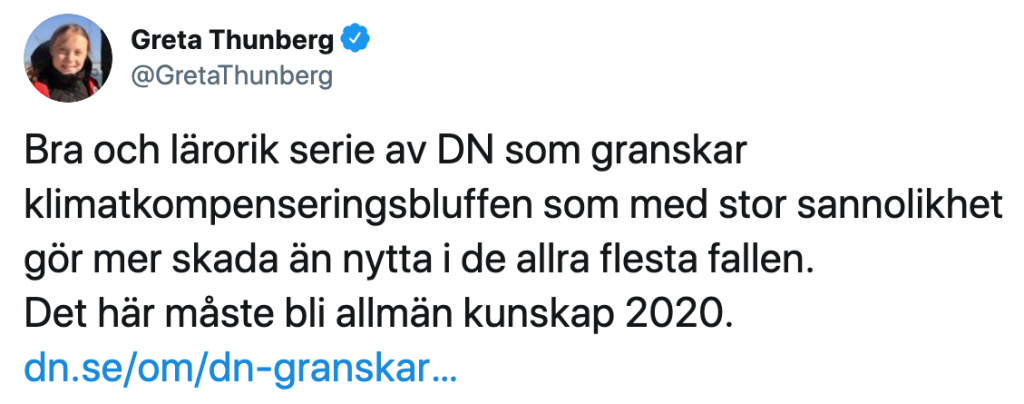In a tweet, Greta Thunberg criticises the “carbon offsetting bluff”. Offsetting “probably causes more harm than good”. A debate has been triggered about the issue in Sweden, in part because the national government uses offsetting to meet its own carbon reduction goals.
atmosfair agrees with the criticism. We have already publicly criticised many of the issues raised in the past, as in the TAZ newspaper interview with atmosfair titled “climate-neutral bluff”. In the following you will find Greta’s tweet, contextual information about the controversy with related newspaper articles in Sweden, as well as other sources and studies.
Der Tweet von Greta
Thunberg is referring to an extensive series of articles in the Swedish newspaper Dagens Nyheter. The newspaper’s special feature, which so far comprises 25 articles, includes several investigative research reports as well as comments and contributions to debates. The topics covered are also relevant outside of Sweden.
The article series in “Dagens Nyheter”
Summary
Greta tweets about a series of 25 articles published in the Dagens Nyheter newspaper about carbon offsetting. We provide the most important articles in the next section and take a detailed look at the criticism. If available, we provide relevant sources for more information.
The key findings of the articles: Sweden has committed to reducing carbon emissions by 40% from 1990 levels by 2020. The aim is to achieve some of the reductions in non-European countries through offsetting projects. This involves approx. 1 to 7 million tonnes of carbon dioxide emissions – and almost EUR 100 million.
But these projects have been quite contentious as of late: for instance, reports were downplayed after local farmers in a forest project in Uganda were evicted from their land by police and the military at gunpoint. Conflicts of this kind were the reason atmosfair decided against forest projects for carbon offsetting as a matter of principle.
The Swedish government’s cooperation with Swedish and other offsetting companies came under fire because they have parent companies in tax havens and no evidence of offsetting could be provided in some cases.
Another focus of DN’s research is the effectiveness of carbon offsetting. One study shows that a considerable number of the projects had no impact because they would have been implemented even without the money for offsetting. After its publication by the Öko-Institut in 2016, we posted this study on the atmosfair website and asked the Gold Standard Foundation in Switzerland to tighten their rules. In our own projects, we go much further to ensure that they clearly demonstrate “additionality”.
Several DN articles deal with the widely differing carbon calculations performed by airlines and offsetting companies. And they highlight the problems of the aviation industry’s new, global CORSIA system , which comes into force in 2020. This is also how we see it at atmosfair. Furthermore, DN discusses the question of when compensation makes sense at all, and when it constitutes greenwashing and can therefore even be counterproductive. atmosfair has also been voicing this criticism for years, e.g. on offsetting petrol or diesel for cars, because in this case the less effective option of offsetting is preventing the implementation of a much better solution, e-mobility with green electricity.
The Dagens Nyheter articles in detail, with comments from atmosfair and with links to further reading
In the following section, atmosfair provides summaries and its own conclusions on six important issues researched by the Dagens Nyheter newspaper. In addition, you will find relevant links to the issue in each section.
The controvery over afforestation projects
Offsetting from tax havens
The additionality problem of carbon offset projects
Dubious carbon emissions calculations for flights
Criticism of CORSIA, the aviation industry’s offsetting scheme
Greenwashing of petrol and diesel



 Share
Share Tweet
Tweet